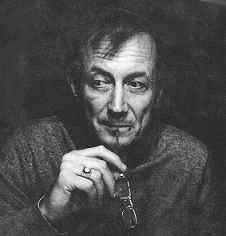
 |
|
First Word |
|
 |
|
|
A word from a poet
|
|
 One of the causes for the absence of idealism in our
world today is the absence of a new philosophy. We need a new
philosophy that will sum up all the tragedies of the twentieth
century so that we can avoid another and this time final
tragedy. This philosophy must develop a new ethics that will
unite rather than divide people. Humanity is pregnant with
this new philosophy, which is kicking from inside, seeking a
way out. One of the causes for the absence of idealism in our
world today is the absence of a new philosophy. We need a new
philosophy that will sum up all the tragedies of the twentieth
century so that we can avoid another and this time final
tragedy. This philosophy must develop a new ethics that will
unite rather than divide people. Humanity is pregnant with
this new philosophy, which is kicking from inside, seeking a
way out.
I have no intention of offering recipes for
creating ideals. Clever recipe givers inevitably fail like the
television evangelists. Not everyone is able to be a hero, but
everyone has the opportunity not to be a scoundrel.
On
the other hand, I believe there is nothing higher than the
ideal of human brotherhood. Even a family will fall apart if
the concept of brotherhood is missing. War between nations is
nonbrotherhood. An undeclared war envy, jealousy, gloating,
insincerity, lack of frankness against someone close to you is
Nonbrotherhood, too. We must conquer the nonbrotherhood in
ourselves, and that will make universal brotherhood possible.
Brotherhood, if given a chance, is an ideal that can be held
in common by people of the most varying political and
religious views.
Idealists are often laughed at. They
are considered eccentric, unrealistic, and sometimes even
crazy. At the turn of the century the bourgeois in the Russian
provincial city of Kaluga used to laugh the parochial-school
teacher Tsiolkovsky, who made blueprints for interplanetary
spacecraft. Yet he invented the principle on which our
spacecraft are built. If the founder of the new philosophy
could become not just international but interplanetary, people
would laugh at him, too. Yet we need such a philosophy.
The twentieth century devours ideals. It gave birth to
chemical and atomic weapons, the Holocaust, Hiroshima,
genocide in Cambodia, terrorism, sex shops, AIDS, and one of
the most debilitating drugs television. Technical progress
turned out to be a synonym for spiritual regression. The
twentieth century also killed our revolutionary idealists. It
murdered Mahatma Gandhi, Martin Luther King, Che Guevara, John
F. Kennedy, Aldo Moro, and Olof Palme.
To the gigantic
number of starving is constantly added the gigantic number of
spiritually starved. Acknowledged spiritual hunger, however,
is not terrible. What is terrible is unacknowledged spiritual
hunger, especially when it seems like comfort. Fear or
burglary makes people put numerous locks on their doors. But
at the same time, they put locks on their souls so that no one
can open them and see whats inside. For many the
standardization of thought is not a catastrophe but a
salvation. Instead of listening to the world, people plug up
their ears with earphones playing music. They jog right past a
mugging victim and fail to hear the victims moans. We are
replacing our eyes with peepholes on doors. Many of us living
in enormous apartment buildings dont know our neighbors on the
same floor and dont want to know them. Then why the hell know
our neighbors on the planet?
Instead of being a window
on the world, a newspaper in the hand becomes a curtain for
blocking out the world. The habit of watching a visual salad
of human suffering with a cloying dressing of advertising on
the TV news leads to the habit of contemplating those
sufferings instead of sharing them.
Think of the time
we all spend at parties that are merely counterfeit human
contact. Just try responding to How are you? seriously. Say
that things are not good at home, youre are not sleeping
nights, youre contemplating the best way to commit suicide,
and that you have lost faith in yourself and in everyone else
and the questioner will back away from you, thinking you have
lost your mind. He may be having problems at home himself or
maybe up all night thinking about the same things, yet he cant
admit it because he is afraid of appearing weak. Speaking
openly of your weaknesses is human strength. Pretending to be
strong is a weakness that can turn into a disease.
This fear of personal confession then turns into a
national fear. At the same time that secret services worldwide
are achieving great heights in mutual eavesdropping, nations
are losing the savings ability to hear each others heartbeats.
Many international political negotiations break down because
they are built on mutual accusations instead of on mutual
confessions.
Calling one government the symbol of all
bad on the earth, and ones own government the symbol of all
goods is nothing other than fear of confession. We will
achieve a lasting peace on the Earth only when political
negotiations are built on mutual courage.
The most
important thing facing us now is to save the world from
nuclear catastrophe. If we do save it,
Will it be a world
without ideals, based only on biological deal? Estranged from
one another, will we have made a cold calculation for our
physical survival? Will we replace the ideal of human
brotherhood with pragmatic détente, promising only
temporariness and undependability? Will we give up and betray
the best of humanity? Or will we recognize a world where all
religious and political views are accepted?
|
 |
|
|
|
|
|
 |
| |
 |
| |
|
| |
| |




